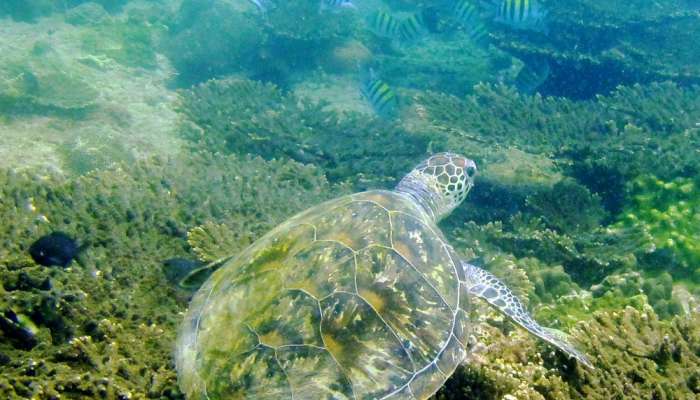
Muscat: The Sultanate of Oman has placed paramount importance on protecting and sustaining its marine environment, diligently safeguarding it through a series of well-considered initiatives and policies.
With an extensive coastline spanning approximately 3,165 kilometres, Oman is home to a rich biodiversity that includes coral reefs, seabirds, fish, and endangered species such as sea turtles, whales, and dolphins.
The Environment Authority is tasked with developing environmental strategies and plans to protect coastal and marine ecosystems.
It conducts scientific studies and research to address environmental challenges such as pollution, overfishing, and climate change, in alignment with the priorities and programs of Oman’s Environmental Strategy and Oman Vision 2040.
Eng. Ahmed bin Said Al Shukaili, Director of the Marine Environment Conservation Department at the Environment Authority, stated that Oman has implemented numerous projects in this field, most notably the Artificial Coral Reefs initiative. This project aims to rehabilitate damaged coral reefs, enhance biodiversity, support sustainable fishing, and protect coastal areas.
He further informed Oman News Agency (ONA) that the Sultanate of Oman has established several marine reserves, including the Turtle Reserve, the Dimaniyat Islands Nature Reserve, and the Khor Reserves in Dhofar Governorate, which provide a safe habitat for endangered marine species.
He added that Oman also places great emphasis on international cooperation in marine conservation, participating in global environmental agreements and programs such as the Convention on Biological Diversity, which focuses on preserving biodiversity and ensuring its sustainable use.
This contributes to strengthening Oman’s efforts in addressing global environmental challenges related to oceans.
In line with its international commitments, Al Shukaili pointed out that Oman fulfills its obligations by submitting national reports to regional and global conventions, including the Convention on International Trade in Endangered Species (CITES), the Ramsar Convention on Wetlands, and the Indian Ocean Sea Turtle Memorandum of Understanding.
Additionally, Oman has intensified efforts to combat illegal wildlife trade while raising public awareness through educational campaigns and workshops to engage citizens and residents in marine conservation.
He highlighted the Environment Authority’s national efforts represented in protecting endangered marine species through environmental laws and regulations, such as the Environmental Protection and Pollution Control Law and the Natural Reserves and Wildlife Conservation Law. These laws safeguard beaches, marine life, and sensitive ecosystems like coral reefs and mangroves, while regulating the discharge of liquid and solid waste into marine and coastal environments.
He explained that the Environment Authority has also undertaken coral reef rehabilitation projects in collaboration with national entities, including the strategic placement of decommissioned military equipment and concrete structures to create suitable habitats for coral growth and marine organism reproduction.
Furthermore, it conducts an annual Marine Pollution Monitoring Project, sampling water and sediment along Oman’s coastline—from Musandam to Dhofar—to measure pollutants such as heavy metals and hydrocarbons, providing critical data on marine pollution levels, particularly near industrial ports.
He further said that advanced tracking technologies are being utilised to monitor marine species, particularly whales and sea turtles, by tagging them to study their behaviour, feeding grounds, and migration patterns.
This year marks the final phase of the Whale and Dolphin Survey Project in Musandam Governorate, which will inform a national management plan for marine mammal protection.
Dr. Amer bin Nasser Al Ma’tani, Chairman of the Environment Society of Oman (ESO), highlighted the strong partnership and ongoing collaboration between the Society and the Environment Authority in research, studies, and projects since the Society’s establishment in 2004.
In a statement to Oman News Agency (ONA), he noted that the Society is currently implementing four marine conservation projects: Whale and Dolphin Studies and Conservation, Sea Turtle Studies and Conservation, Coral Reef Studies and Conservation, and Awareness Programs on the Dimaniyat Islands Nature Reserve.
He added that the Society conducts extensive awareness, education, and outreach activities targeting all segments of society, providing research findings to the Environment Authority for integration into environmental policies.
The Authority ensures the Society’s participation in national environmental committees, fostering collaboration between government and civil sectors.
Al-Ma’tani emphasised that Oman’s marine environment faces multiple threats, including natural hazards like cyclones, climate change, and rising sea temperatures, as well as human-induced challenges such as overfishing, bycatch, plastic pollution, oil spills, acoustic pollution, and irresponsible tourism.
He pointed out that the Environment Society of Oman (ESO) plays a pivotal role in raising environmental awareness, educating the public on the importance of preserving ecosystems and biodiversity for current and future generations. Oman’s waters host globally significant marine species, many of which are endangered, prompting the Society to launch community engagement initiatives that foster environmental responsibility.
He said that the Society conducts scientific studies on critical marine habitats and endangered species, proposing conservation measures and policy recommendations for implementation by relevant authorities. It also spearheads initiatives to shift public behaviour, particularly in ecologically sensitive areas like Masirah Island and the Dimaniyat Islands Nature Reserve.
He added that through school programmes, university collaborations, and community outreach—especially in coastal regions—the Society promotes environmental stewardship among fishermen, farmers, women’s associations, and local communities. Its awareness campaigns, developed in partnership with public and private institutions, empower individuals to protect their environment, livelihoods, and future.
The Sultanate of Oman continues to enhance the management of marine reserves, recognising their vital role in safeguarding biodiversity amid growing threats from climate change, pollution, and overfishing.
The Dimaniyat Islands Nature Reserve, a key habitat for sea turtles, coral reefs, and migratory seabirds, stands as a testament to these efforts. -ONA
--